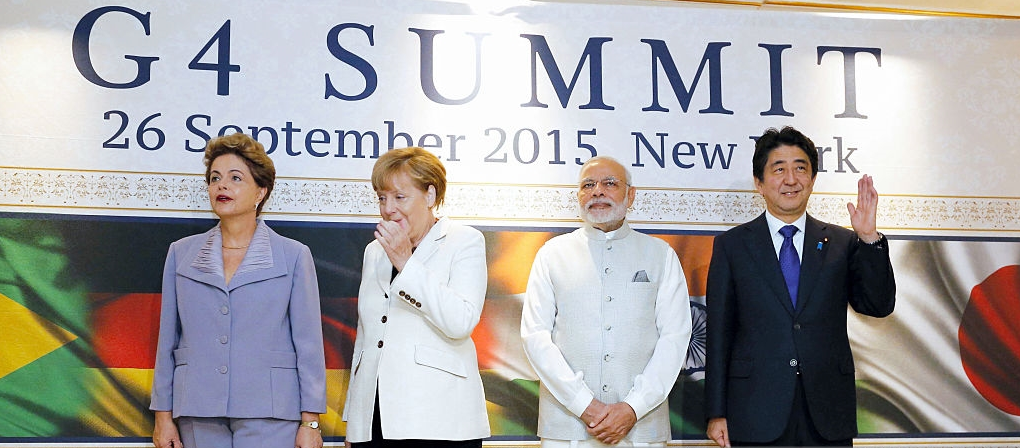
The United Nation’s recent draft resolution seeking a change in the composition of permanent members in the Security Council, often termed a “Big Boys” club, has generated much euphoria in diplomatic circles of countries like India, Brazil, Japan, and Germany- a group coined as the G-4. However, it is this euphoria which demands a critical analysis of the UNSC itself. It is imperative to understand whether a permanent seat on the UNSC is worth the effort put by these countries, and especially by India. I.e., is a permanent seat a “feather” on the hat or the “hat” itself?
India has been a strong and old contender for a permanent seat on the UNSC since 1955. To realize this dream it has left no leaf unturned and has even managed to get assurances from almost all countries including big guns like the United States, Great Britain, and Russia and even from G-4 nations. It is almost unacceptable for people in power in India to digest the fact that a country with 1.2 billion people and a $2 trillion economy, that is the third largest country in terms of purchasing power parity, and that is a major contributor to UNPKF isn’t a member of the UNSC club. The above sentiment is evident from Indian Prime Minister Narendra Modi’s recent address to the 70th UN general assembly where he called for UN reforms “so that it carries greater credibility and legitimacy and will be more representative and effective in achieving our goals,” while directly asking for India’s permanent membership to the UNSC. India has even taken up this issue in various summit level interactions with countries like the United States, Great Britain, France, and Russia with all of these countries giving verbal assurances. India’s itch for the Security Council does make sense. However, my question isn’t about the criteria for India’s eligibility. Rather, it is about the UNSC’s significance in contemporary global politics.
Recent years have shown the United Nations, especially the UNSC, as a body deviating from its raison d’être and heading towards failure. It has become a parking lot for bureaucrats and political appointees. A close look at changed geo-politics and the United Nations’ incompetence to deal with it makes the above point clear. The major problems confronting the world today include turmoil in the Middle East accompanied by the rise of ISIS/ISIL, the rise of an assertive China, and the standoff between Russia and the West over Ukraine. However, notwithstanding its role to maintain peace and order, the UNSC hasn’t been able to draft out a concrete solution on any of these issues.
In fact, NATO intervention in Libya in 2011 has made the situation on ground worse. The recent exodus to Europe from these countries and the drowning of 700 Libyan refugees could in a way be attributed to the above intervention. The recent Syrian war has further exposed the weakness of the UNSC in fulfilling its objective of maintaining peace and order, with UN-Secretary General Ban-Ki-Moon raising his hand in defeat and claiming “Syria is our collective failure.” Other incidents include the U.S. invasion of Iraq in 2003 without the UNSC’s approval, China’s reluctance to accept any international arbitration on the South China Sea conflict, and the current impasse over Ukraine.
Next is the jackpot question of veto power, which is one of the major reasons for these persistent efforts made by G-4 countries, especially India, to gain a permanent UNSC seat. Given India’s policy of non-alignment in the past, veto power might complicate things further. A close look at voting patterns reveals that Russia and China are mostly on one side, while NATO partners are on the other. Given the strategic partnership that India maintains with each of these countries, taking a stance would not only adversely affect India’s relationship with them, but would also give a severe blow to India’s non-alignment stance. Hence, strained relations with these nations could lead to a possibility of exposing India to increased international pressure on issues like the Kashmir dispute, human rights abuse in the north east, and climate change reform.
In today’s world, issues like trade, security, and energy pertaining to long-term interests of emerging economies like India are achieved by bilateral negotiation. Examples include the U.S.-India nuclear deal as well as the Carbon Emission Agreement between the United States and China, both bilateral in nature. Placing one’s weight heavily on multilateral organizations like the UNSC seems illogical. Owing to the above-mentioned trend of global politics, India should focus more on engaging its diplomatic capital dynamically in bilateral fora rather than investing in moribund institutions like the UNSC.
With booming economies and youthful populations, developing nations – including India – appear just in their demands regarding a permanent UNSC seat. In fact, the inclusion of new countries would make the UNSC structure much more democratic and would reflect the changed realities of 21st century global politics. It would also infuse multiple viewpoints in the council, enabling it to take a more nuanced view of cascading political turmoil. Thus, if the UNSC is to maintain its legitimacy in a continuously evolving global, political structure, it is the UNSC that needs these members rather than the other way around.
***
Image: The Asahi Shimbun, Getty


